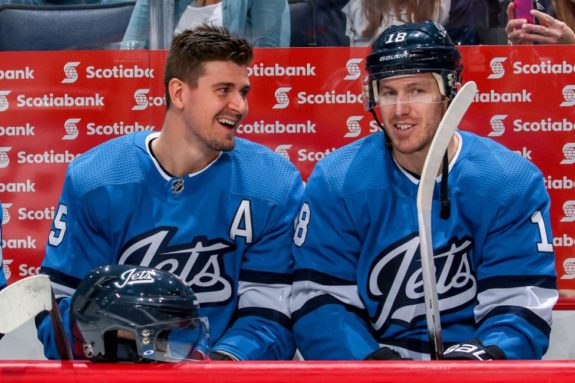Not every player gets to play into their late 30s, or leave the game on their own terms. Some, because of recurring injuries or one significant one, are forced to retire years before they planned or when others of the same age are just hitting their primes.
The Winnipeg Jets have had a few of those players in 2.0 history. These three men didn’t get to play as long as they wanted, but all contributed to the team in some way and showed resilience and grace as they carved out meaningful post-puck lives.
Bryan Little
An errant shot. A stomach-turning scene. A career snuffed out in a second.
The sight of Bryan Little taking a Nikolaj Ehlers slapper to the side of the head and crumpling to the ice behind the net is the worst moment in Jets 2.0 history, much worse than any one loss or early playoff exit. It happened on Nov. 5, 2019 during the third period of the Jets’ contest against the New Jersey Devils at then-Bell MTS Place and ended the centre’s career.
Little was completely unaware Ehlers’ shot was headed straight for his head and could do nothing to brace himself for or avoid the impact.
He was first taken to Winnipeg’s St. Boniface Hospital to receive stitches to fix the huge cut the impact opened, then was transferred to the Health Sciences Centre’s neurological unit for observation. He was later diagnosed with a brain bleed, concussion, and a perforated eardrum that required surgery.
Little was one week away from his 33rd birthday and one week removed from scoring the overtime game winner at the 2019 Heritage Classic in Regina versus the Calgary Flames, which turned out to be his final NHL goal. He was playing in his 843rd-career NHL game when the incident occurred and was on the second year of a six-year contract extension he signed in 2017. He would have been a Jet, or at least still playing on that deal somewhere, through 2023-24 had the injury not occurred.
Little, drafted 12th overall by the Atlanta Thrashers in 2006 and one of the players the Winnipeg ownership group inherited when they bought and relocated the franchise in 2011, took a lot of flak from Jets’ fans for his straightforward north-south play style. While it’s true he didn’t mesh perfectly with every player who flanked him on the second line, he was underrated and consistent, recording 40-plus-point seasons in all of his seven Jets campaigns that weren’t the 48-game lockout-shortened 2012-13 and his unfortunate final season. The Jets have not found a long-term solution at second-line centre since.
In 2020, he lamented that if he’d have been wearing ear guards, the injury may not have occurred as “it hit perfectly on my ear hole.”

Almost a year after the injury occurred, he was ruled out of the shortened 2021-22 season, which was slated to begin in January, 2022 after COVID-19 ground the sports world to a halt the previous spring. He sought a number of medical opinions as to if he could ever play again, but said in 2023 “at the end of the day, there wasn’t anyone telling me it was a good idea to come back and couldn’t really tell me what would happen if I got hit badly again.” (From ‘”A lot of life to live after playing”: Cambridge native Bryan Little shares decision to unofficially retire from hockey,‘ Cambridge Times, May 8, 2023.)
The Jets initially put Little on long-term injured reserve (LTIR), but he did them a solid by waiving his no-trade clause so the team could trade his rights to the Arizona Coyotes in March 2022, who were just trying to get to the salary cap floor at the time. Having players on LTIR prevents a team from accruing salary cap space during the campaign.
Little, now 36, cannot play hockey anymore, but that doesn’t mean he’s just sitting around. In 2023, the NHL featured his growing passion for triathlons. Many fans have advocated for, and this author agrees that, the Jets’ organization should sign Little to a one-day contract somewhere down the line so he can retire as a Jet.
Grant Clitsome
Defenseman Grant Clitsome was a ninth-rounder (yes, the drafat used to have nine rounds) and his career seemed to just be getting going when he was claimed off waivers by the Jets in February, 2012.
The 2004 Columbus Blue Jackets’ pick wasn’t exactly young when he broke into the NHL — after being drafted, he spent four years playing at Clarkson University and two full seasons in the American Hockey League with the Syracuse Crunch before making his NHL debut with the Blue Jackets at age 24 in March, 2010.
2011-12 was his first season as a regular on Columbus’ blue line and he put up decent numbers — four goals and 10 assists for 14 points — in 51 games before being waived and claimed by the Jets. He finished the campaign by putting up three assists in 12 games with Winnipeg, then signed a three-year, $6.2 million extension with the club in 2013 (in the middle of a 2012-13 campaign where he played 44 games and had 16 points while skating an average of 18:50 per game) that would run through the 2015-16 season.

Unfortunately, the 63 games he played and 17 points he amassed in 2011-12 would both be career highs. He suffered a serious back injury on Dec. 17, 2013 against the Buffalo Sabres in Winnipeg and had to undergo surgery the next month, ending the season in which he’d snagged a top-four role and was averaging nearly 20 minutes per game early.
Clitsome returned for the 2014-15 season, but after just 24 games, had to have another season-ending back surgery. He never played again after going under the knife a second time; after a 2015-16 campaign where he didn’t play at all, he announced his retirement at age 31 and 205-career games played.
“It’s tough when something unexpected, and out of your control, suddenly ends your career. Despite the circumstances, I am very grateful to have had the opportunity to fulfil my childhood dream and play in the NHL,” he said in a statement announcing his retirement. “It truly was a special place to play and I’m proud to retire as a Jet.”
Since leaving professional hockey, Clitsome has been a craft cidermaker at a cidery he co-founded and a director of wealth management at a firm dedicated to helping professional athletes transition into life after sports, according to his LinkedIn profile. He is currently the director of hockey for Ashbury College, a private boarding school in Ottawa, and is also a business strategy development director for an industrial water treatment company.
Brett MacLean
You could be forgiven if you don’t remember Brett MacLean. The forward played in just five games for the Jets in the first month of their inaugural 2011-12 campaign, when the cupboards they inherited from the Atlanta group were basically bare of viable prospects and the roster featured a revolving cast of fringe players.
Related: Jets’ 2011-12 “Extra Large” Roster
The 23-year-old winger, claimed off waivers from the Phoenix Coyotes before the season began, recorded two assists in those five contests before being waived in late October and reclaimed by the Coyotes. He finished his season by playing 63 games with the AHL’s Portland Pirates, piling up 48 points (25 goals, 23 assists.)
Those were the last professional games the 2007 second-rounder would ever play as he had a near-death experience shortly after. On July 2, 2012, he suffered a cardiac emergency while playing a hockey with friends in Owen Sound. “I remember going to the arena and going on the ice and that’s it,” MacLean said in October, 2012. “I guess 40 minutes in I made a pass and just collapsed.”
Two of his friends jumped into action and performed CPR until a firefighter arrived and used the arena’s defibrillator to save his life. He had a cardiac defibrillator implanted during surgery and was forced to retire as a result.
MacLean stayed in the game, however. He served as an assistant or scoring development coach for the University of Waterloo Warriors men’s hockey team from 2013 through 2021 and ran a varsity hockey program at The Hill Academy in Caledon, Ontario from 2017 to 2023.
He now owns his own hockey school, works as a skills development coach at Noble Sports Performance, and is the assistant director of hockey at Upper Canada College in Toronto, according to his LinkedIn profile. Since September, 2012, just two months after his cardiac experience, he has also been a spokesperson and public speaker for the Heart and Stroke Foundation.
